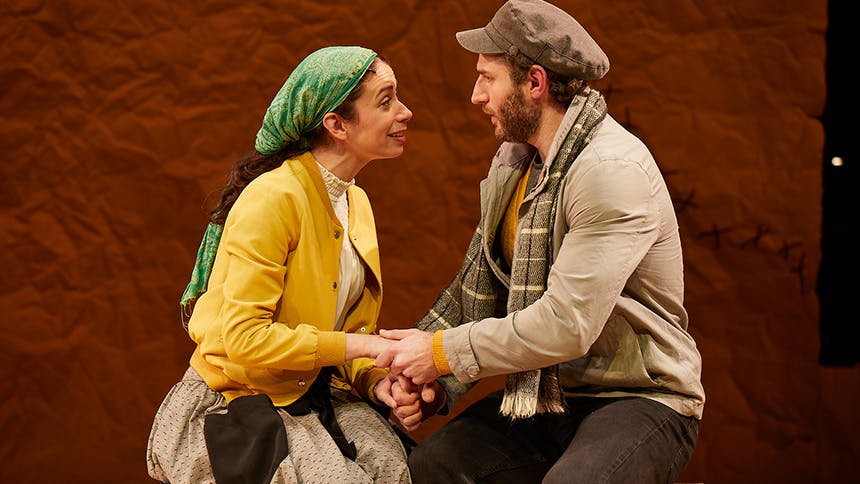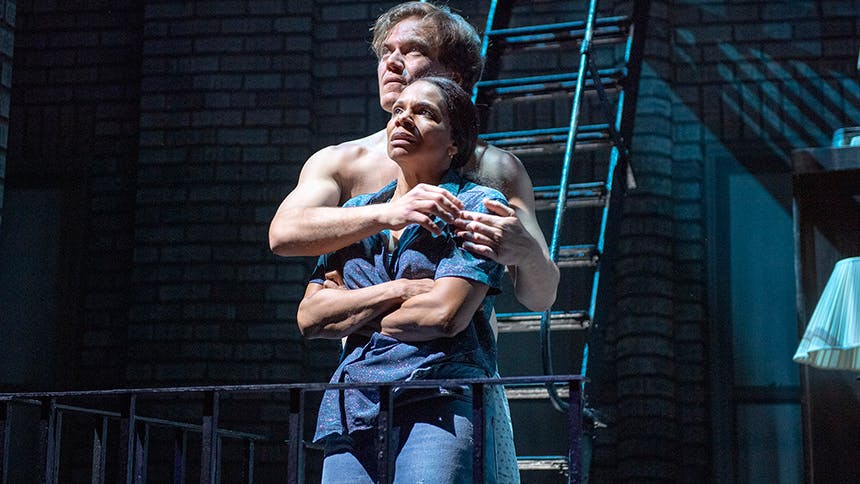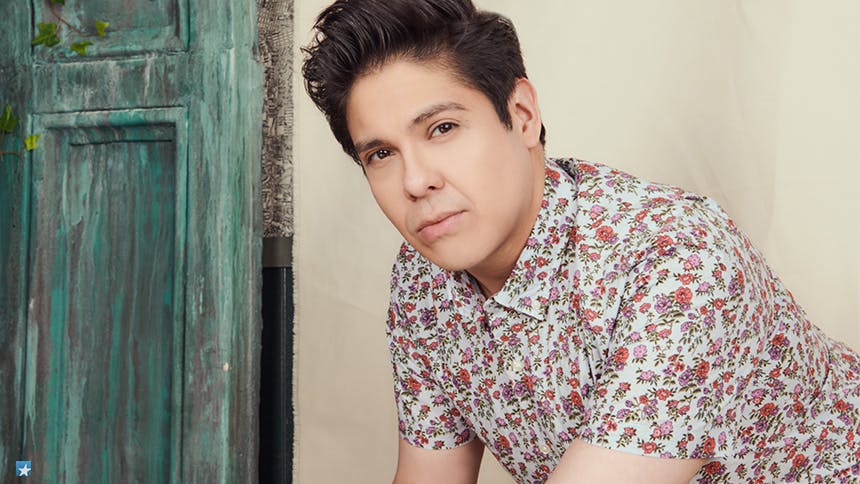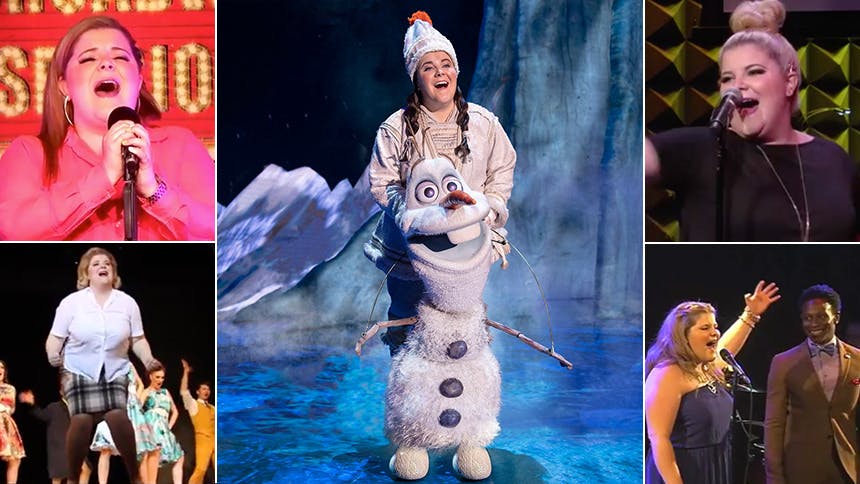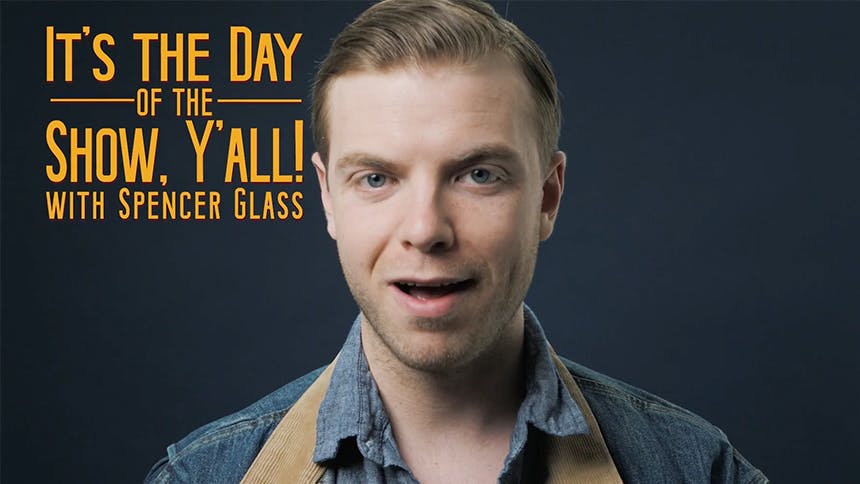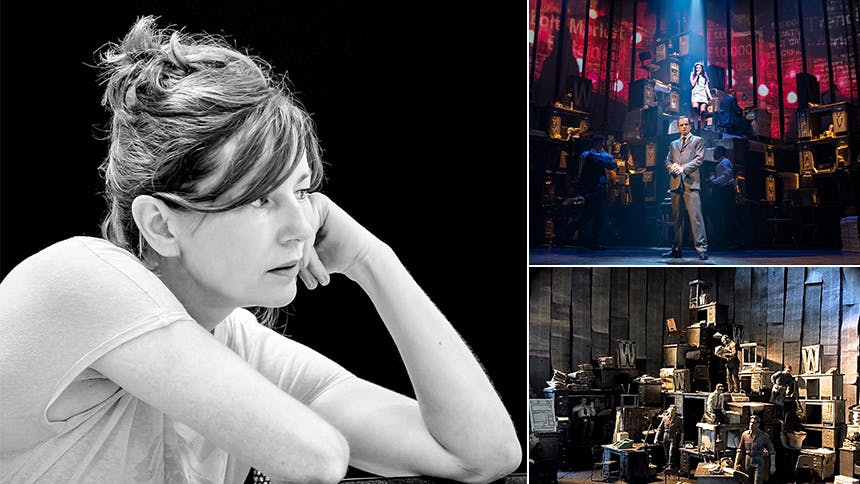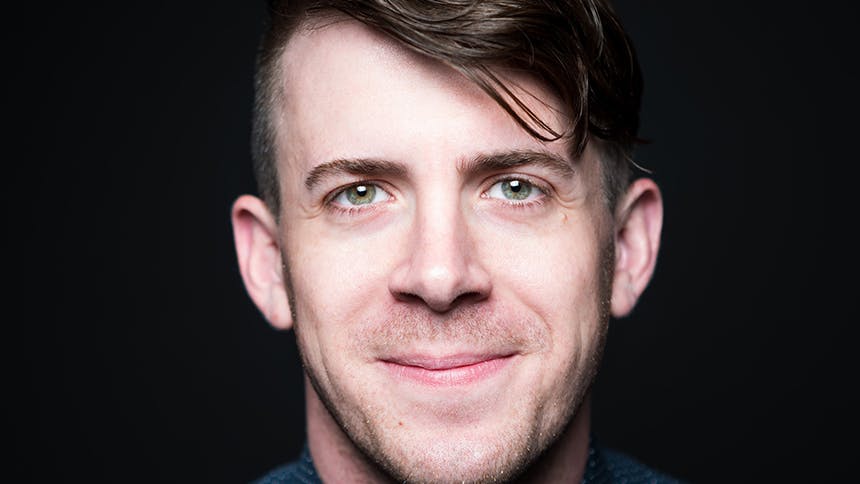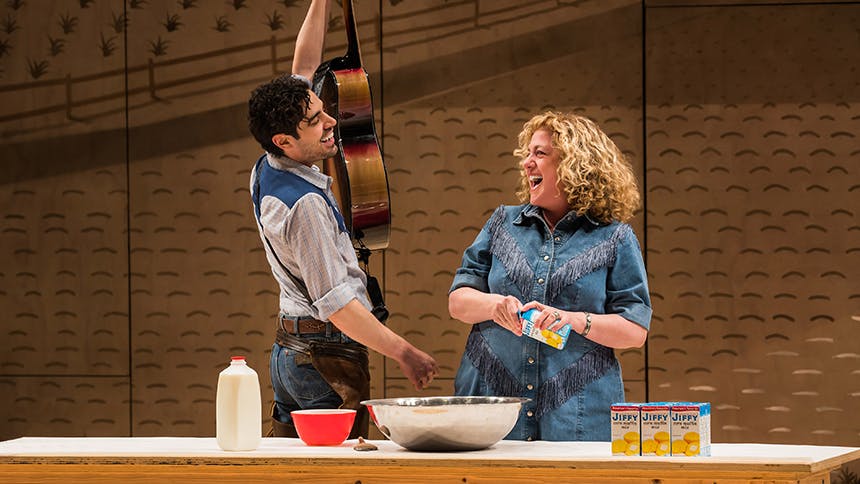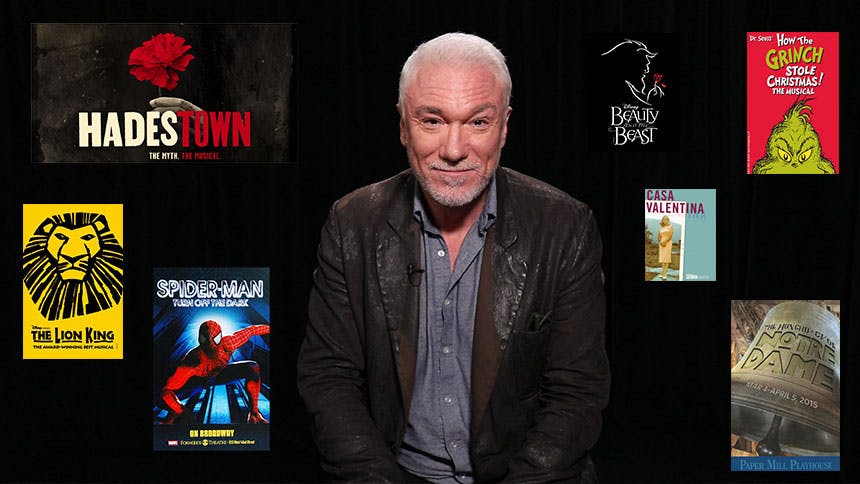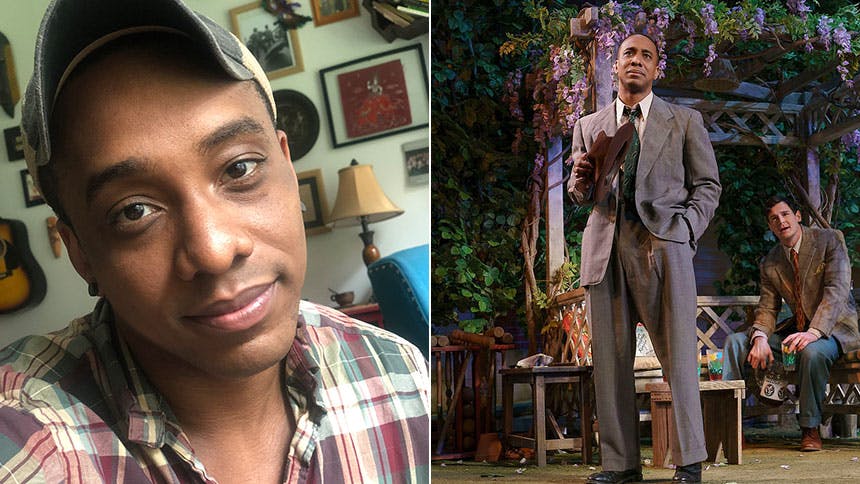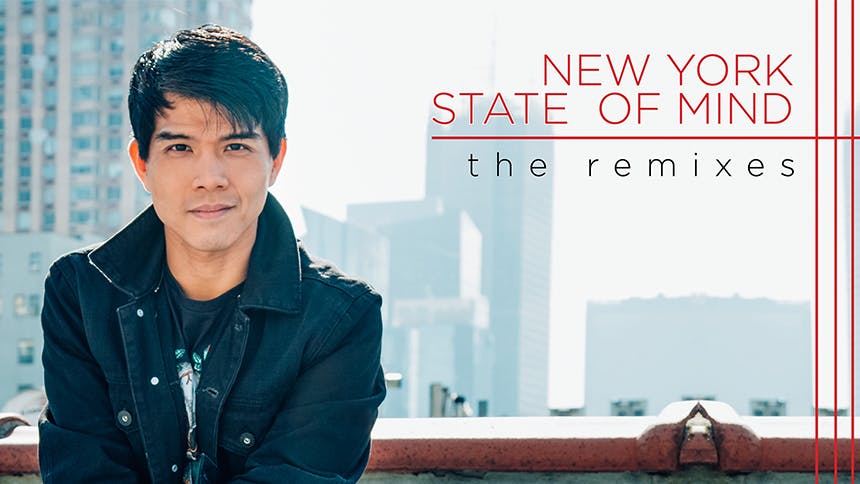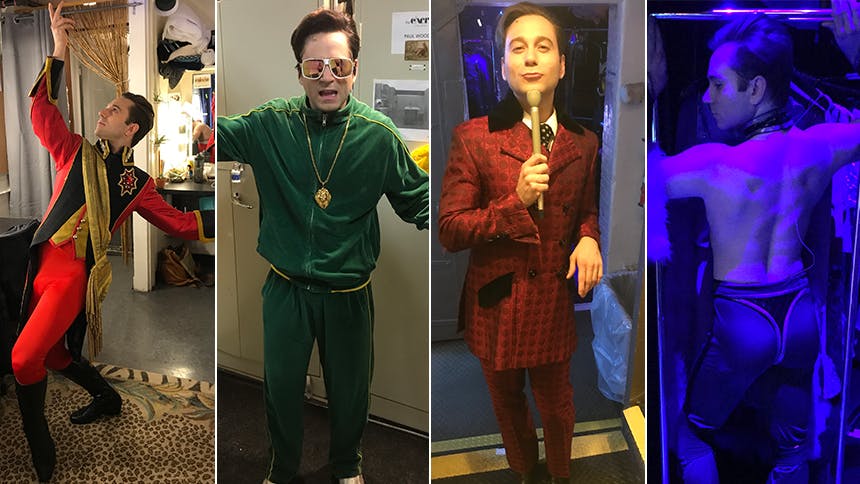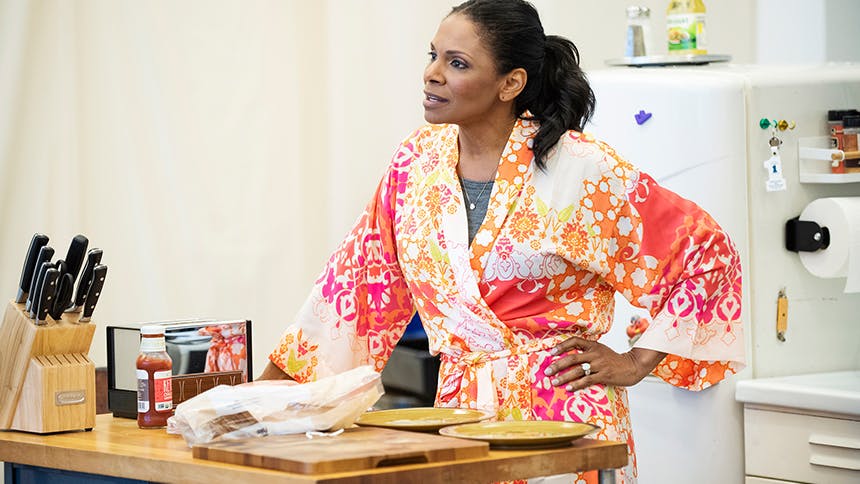If you have even a passing interest in Fiddler on the Roof
, then you have to run and see the award-winning off-Broadway revival directed by Oscar and Tony winner Joel Grey! Performed in Yiddish with English subtitles, this Fiddler on the Roof is incredibly powerful and feels so current, in large part because of the fantastic, grounded performances. This month, we spotlight each of Fiddler’s onstage couples, and next is the real-life couple who co-star as the progressive and politically-minded young pair Hodl and Pertshik, Stephanie Lynne Mason and Drew Seigla. Read on as the duo discusses the discovery process with director Joel Grey, their stunning co-star Steven Skybell, and Fiddler as a feminist piece..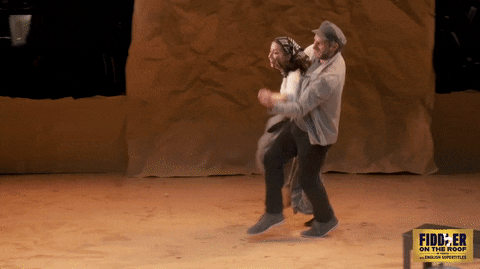
What was your first introduction to Fiddler?
Stephanie:
My first introduction to it was when I moved to New York at 18, and one of my first professional auditions was for the 2004 revival. I knew nothing about the show before then, but that’s when I watched the movie and got to know the show from there continuing to audition and perform in other productions.
Drew:
While this production of Fiddler on the Roof in Yiddish is actually my first Fiddler on the Roof ever as an actor, the first time I was introduced to Fiddler was during my freshman year when I sang tenor on a medley arrangement of the musical hits from Fiddler on the Roof with the J.R. Tucker High School Concert Choir in Richmond, VA.
Why do you think Fiddler feels so important and relevant right now?
Stephanie:
I think it’s relevant in many ways. While the show is a Jewish story and a very important one at that, the show does a beautiful job of highlighting that unfortunately, many people are ultimately afraid of what they don’t understand, whether that be race, religion, sexual orientation—among many other things of what they consider “other” than themselves. We see the citizens of Anatevka, who we love and are rooting for, persecuted and forced out of their homes. It also tells the story of a family: a father who loves his daughters and how he and his wife cope with changing times and the daughters breaking tradition. I also think it’s a feminist story in how the daughters assert themselves and make their own decisions despite the way things have always been.
Drew:
Sadly, Fiddler feels relevant in 2019 because intolerance towards those who aren’t considered the majority is being encouraged by those who are in a position of power. Many examples can be sited throughout history, but currently between the refugee migration crisis, the separation of families at the southern U.S. border, the unbalanced distribution of wealth, and the growing hatred and episodic violence towards different minorities eerily mirrors how the Jewish villagers of 1905 fictional Anatevke are perceived by the Russian Empire. I think it all boils down to people fear what they don’t understand. What Fiddler highlights is, while every race/group of people inherit different individual traditions and customs, these differences among us shouldn’t marginalize anyone’s unalienable right for freedom. At the core, we are one.
What is a tradition that is important to you (could be a religious tradition or even a pre-show ritual)?
Stephanie:
This isn’t really a “tradition” so to speak, but I love baking and cooking for friends and castmates. It’s a way of showing love, and also a way of relaxing and centering myself.
Drew:
I’ve made it my own tradition to practice an abridged Vinyasa yoga flow fifteen minutes before the second show’s curtain during two-show days. Performing two shows per day is hard on anyone, and I personally find Fiddler to be more draining than other shows I’ve done largely because A. it’s three hours long, and B. because of its emotional intensity. Having approximately fifteen minutes to practice yoga before the show allows me to find my breath, stretch my body, and achieve the proper mental clarity to execute a refreshing second show with more clarity, energy, and creativity.
When crafting your performance, what was the most important thing director Joel Grey said to you?
Stephanie:
He said so many important things, but I think his intent on honesty and simplicity is what makes the show as special as it is…
Drew:
Simply said, keep it simple. In fact, this became the mindset established for the very first rehearsal when we began scene work. The creative process began by just speaking the English translation of the Yiddish lines in a quiet room sitting across from one another. This process of working with English first allowed us to get to the root of the emotion of the text, versus only concerning ourselves about the diction of the Yiddish. Also, he would constantly stress during rehearsals for each of us to strive to portray real people, not stereotypical caricatures. Realism, and also the commitment of establishing a fourth wall with the audience was crucial for the entire cast to only focus on the given circumstances of the world of Anatevke, and nothing else.
Also, Joel adamantly insisted that everything contain an element of discovery. In fact, I remember a specific memory where during the recording of the cast album that he stopped me after singing my first two takes of “Now I have Everything,” and said to me, “Drew, now you need to discover.” He wanted me to discover these thoughts and emotions for the first time—to not have anything set in stone. His advice completely changed me in that moment. Suddenly, my phrasing and acting of the song became spontaneous, and I felt transformed. That third take will be the track used for the album!
How has your performance changed or grown since you first took on the role? Is there anything you feel like you know about the character or their relationship now that you didn’t before?
Stephanie:
Well, I started off the show with a different Pertshik. Dan Kahn is a Yiddishist, incredibly smart, and incredible actor, and we (with Joel) were really able to find the Hodl/Pertshik dynamic together. When he left to go back to Germany and get married, Drew Seigla who is also amazing and incredible, joined the cast. Different people bring different energies to a role so the dynamic changed and grew in a different way…not to mention that Drew now happens to be my boyfriend in real life too. Also, Steven Skybell is the best scene partner anyone could have the privilege of playing opposite. He is always honest and in the moment and the train station scene is always different but has deepened over time and become more specific. I think in general with repetition over time, and the cast getting to know each other better you gain more detail and more specificity so the show has definitely deepened.
Drew:
So many elements of Pertshik have changed and grown since my opening night performance. Not only is this my first Fiddler on the Roof, but it’s also my first show set in the Yiddish language. Luckily, I was meticulously coached by NYTF’s diction coach, Motl Didner, on how to pronounce every vowel and syllable of Yiddish as well as adopting the correct stress and cadence of the language. Opening night was especially scary for me since I didn’t know much of anything in Yiddish besides my lines alone; there was no room for ad libs. If I dropped a line then it would have been nearly impossible to recover—luckily I didn’t flub. Presently, I still work on perfecting the Yiddish daily, and I do this with pride because the better I am at understanding every nuance of the language, the more authentically connected I feel as Pertshik, and to the setting of Anatevke during the 1905 Russian Revolution.
I also feel I’ve made my own personal growths through Pertshik’s point of view of the world. Bottom line, Pertshik’s credo is to change the world for the better, and he is willing to take the necessary actions to achieve this goal, despite the oppression inflicted by the Russian Empire. So, when you are constantly in this state of mind as the actor of such a dense role, it can greatly influence your life in a positive manner. Pertshik has encouraged me to look outside my own life’s circle, and to take deeper care more than ever before about the “groyse velt” (bigger world), as well as how I can play an active role in contributing for the betterment of all.
Last, but not least, I must give supreme credit to my stage partner, Stephanie Lynne Mason, who plays Tevye’s second eldest daughter, Hodl. From day one when I arrived to Fidler Afn Dakh, she has been my guiding light through this process. I would not be where I am without her help and support. It doesn’t hurt that she is incredibly beautiful, as well as my girlfriend!
This is such an incredibly moving production. What’s the most emotional you’ve been as an audience member in the theatre?
Stephanie:
Seeing Cynthia Errivo as Celie in The Color Purple. It was such a beautiful, nuanced, incredible performance and I was absolutely destroyed. Also, everyone, RUN to see Hadestown. It is a masterpiece and I was a wreck during that as well…
Drew:
Well, I recently saw Hadestown during their previews, and I must say, I was blown away! In fact, I remember walking away believing I’ve just witnessed a masterpiece. I was sitting next to “Steph”, (Stephanie Lynne Mason) AKA Hodl, and we were both captivated to tears from the beginning as the Greek legend of Orpheus and Eurydice was magically told via the influence of New Orleans jazz. The hauntingly sublime music of Hadestown composer, Anaïs Mitchell, in addition to the obvious parallels between Hadestown and our modern day political climate was overwhelmingly powerful. I was either holding her hand or crying for the majority of the musical. GO SEE HADESTOWN!
Tell me about someone else’s moment in Yiddish Fiddler that you look forward to each night.
Stephanie:
There are a few: I love Mikhl as Mordcha during the wedding. He brings such light and joy to the stage. Jodi shines as Fruma Sarah; and Kirk as Avram the bookseller is also incredible to watch. They bring me so much joy!!
Drew:
It’s quite difficult for me to nail down one specific favorite moment of my fellow Fiddler castmates because everyone is creating so many beautiful, priceless moments; but, if I had to choose only one then I think the audience’s ovation after Tevye (Steven Skybell) sings “If I Were a Rich Man” (“Ven ikh bin a Rothschild”) would take the cake. His honest story telling is like attending a masterclass on acting the song. The clarity, personality, and energy that he expresses puts the audience right in the heart and mind of Tevye. So much rests on the success of this song, and Skybell hits it out the park, setting up the rest of the story to be told. I personally feed off this moment because the conclusion of his applause for singing “If I Were a Rich Man” is my cue to enter as Pertshik from the House R door, (my “secret” entrance). The audience’s ovation after “Rich Man” propels me as fuel for my first big entrance.
Don’t miss Stephanie and Drew as Hodl and Pertshik in Fiddler on the Roof at off-Broadway’s Stage 42.
